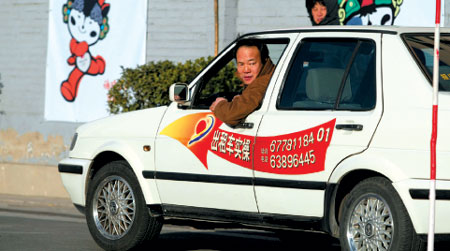Beijing doctors treating foreign patients during the 2008 Olympics will be
required to speak English and also write prescriptions, medical records, and
costs list in both Chinese and English.

An applicant for Beijing Olympic
volunteer driver takes a driving test on December 16,2006.[China Daily]
|
The move is part of a
plan by the Beijing local health authority to boost the city's health services
and make them more visitor-friendly during the Games.
More than 20 hospitals in Beijing, which include the People's Liberation Army
General Hospital and the China-Japan Friendship Hospital, have been selected as
special foreign treatment centers during the 2008 Games.
These hospitals are rated the best in the capital and will continue to import
better medical equipment, improve service standards, and enhance staff training
in the lead up to 2008, according to Jin Dapeng, director of Beijing Health
Bureau.
All doctors and staff at these hospitals will learn English and other
languages in order to better communicate with foreign clients. Multi-lingual
first-aid volunteers will also be recruited.
The Health Bureau will collaborate with banks to ensure foreign patients can
use international credit cards in the hospitals.
Foreign patients can also enjoy traditional Chinese medical services, such as
acupuncture, massage, and herbal medicines.
The improved health network will include a response plan for public health
emergencies, disease prevention and control systems, better medical treatment
and health monitoring and widespread public health information.
"Our goal is to ensure that there would be no outbreak of serious epidemics,
no big public health accidents. We must have the ability to quickly control them
if they appear," Jin said.
He said systems would be set up to ensure every injured or ill person is
given timely first aid and treatment.
Beijing's emergency medical aid center will upgrade its global positioning
system used for ambulances. The Health Bureau will cooperate with the aviation
department to provide air rescue services during the Games.
Jin said a food safety monitoring system covering all Olympic Games'
districts and counties will also be set up this year. Food and drinking water in
the Olympic village, stadiums, hotels and restaurants will be strictly
monitored.
He said a reporting and emergency response system covering intestinal and
respiratory diseases has been established and will be continuously strengthened
to prevent infectious diseases.
"There are still some weak points in the medical system - for example, the
skills and service quality of doctors and nurses need to be improved," Jin
said.